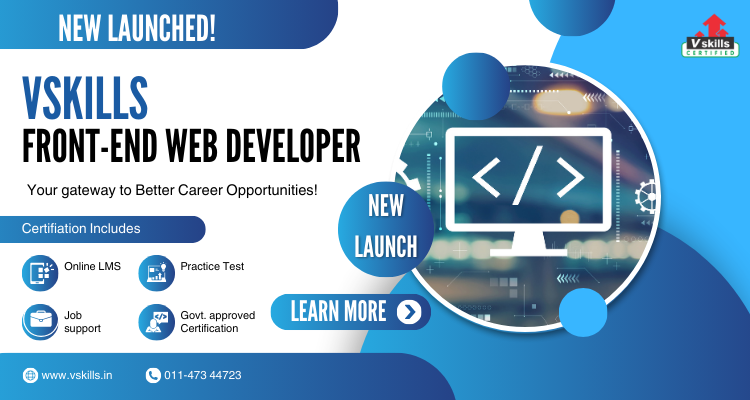As the digital landscape evolves, so does the demand for skilled front-end developers. The digital experience starts with the front end, and that’s where the magic happens! A well-crafted user interface can make or break a website or application. With focus on creating seamless, visually stunning, and highly functional user interfaces, laying the foundation for a successful career in web development.
In the ever-evolving landscape of technology, where user experience is paramount, Front-End Developers emerge as the architects of digital engagement. If you’re captivated by the intersection of design and functionality, a career as a Front-End Developer might just be your ticket to the forefront of digital innovation.
Vskills Front End Developer certification has been developed to equip aspiring developers with the latest tools, knowledge, and hands-on experience needed to thrive in the competitive tech industry. So before we begin lets start understanding about the roles and responsibilities, key skills and career opportunities.
Career as a Front-End Developer
Front-End Developers are in high demand across industries, and the skill set they acquire opens doors to a variety of exciting and dynamic career paths. A career as a Front-End Developer opens up a plethora of opportunities in the rapidly evolving tech industry. As the digital face of web applications, Front-End Developers play a crucial role in creating visually appealing and user-friendly interfaces. Here are some of the exciting career opportunities awaiting Front-End Developers:
- Front-End Developer:
- The most direct path, working as a Front-End Developer involves crafting and implementing the visual elements of a website or application. This role often requires expertise in HTML, CSS, and JavaScript.
- UI/UX Developer:
- Specializing in User Interface (UI) and User Experience (UX) design, UI/UX Developers work closely with designers to create intuitive and aesthetically pleasing interfaces. This role involves a deep understanding of user behavior and design principles.
- JavaScript Developer:
- JavaScript is the backbone of front-end development. Specializing in JavaScript can lead to opportunities as a JavaScript Developer, focusing on creating interactive and dynamic user experiences.
- React Developer:
- With the increasing popularity of React.js, Front-End Developers can specialize as React Developers. React is a powerful JavaScript library for building user interfaces, and demand for React Developers is high.
- Angular Developer:
- Angular is another popular JavaScript framework for building robust web applications. Angular Developers specialize in using Angular to create dynamic and scalable applications.
- Vue.js Developer:
- Vue.js is a progressive JavaScript framework that has gained popularity. Vue.js Developers focus on using this framework to build efficient and maintainable user interfaces.
- Mobile App Developer:
- Many Front-End Developers transition into mobile app development, creating responsive and user-friendly interfaces for mobile applications. Knowledge of frameworks like React Native or Flutter is valuable in this role.
- Full-Stack Developer:
- Some Front-End Developers broaden their skill set to become Full-Stack Developers, with proficiency in both front-end and back-end technologies. This opens doors to a wider range of projects and responsibilities.
- Technical Architect:
- With experience, Front-End Developers can progress to the role of a Technical Architect, where they design and oversee the technical aspects of large-scale projects, ensuring they align with business goals and industry best practices.
- Web Development Team Lead or Manager:
- As you accumulate experience, you may step into leadership roles, managing a team of Front-End Developers or overseeing the entire web development process within an organization.
- Freelance or Entrepreneur:
- Front-End Developers often have the flexibility to work as freelancers or start their own web development agencies. This path allows for creative independence and the opportunity to work on diverse projects.
- Educator or Trainer:
- Sharing knowledge and expertise is a fulfilling career option. Front-End Developers can transition into roles as educators, trainers, or course instructors, contributing to the growth of the next generation of developers.
Skills and Knowledge Required
Becoming a successful Front-End Developer requires a combination of technical skills, design proficiency, and a deep understanding of user experience. Here’s an elaboration on the key skills and knowledge areas essential for a Front-End Developer:
1. Proficient in HTML, CSS, and JavaScript:
- HTML (Hypertext Markup Language): Mastery of HTML is fundamental for structuring content on the web. A Front-End Developer should be proficient in creating semantically meaningful and accessible HTML code.
- CSS (Cascading Style Sheets): Strong skills in CSS are essential for styling web content. Understanding layout techniques, responsiveness, and CSS preprocessors (like Sass or Less) is crucial.
- JavaScript: A deep understanding of JavaScript, including ES6 and beyond, is vital for creating dynamic and interactive user interfaces. This includes proficiency in DOM manipulation and asynchronous programming.
2. Responsive Web Design:
- Ability to design and implement responsive web pages that adapt seamlessly to various devices and screen sizes.
- Knowledge of media queries, flexible grids, and fluid layouts is essential.
3. Frameworks and Libraries:
- Familiarity with front-end frameworks and libraries such as:
- React.js: For building user interfaces, especially single-page applications.
- Angular.js or Vue.js: Depending on project requirements and personal preferences.
- jQuery: Useful for simplifying JavaScript tasks and handling cross-browser compatibility.
4. Cross-Browser Compatibility:
- Ensuring that web applications work consistently across different browsers and devices.
- Knowledge of browser developer tools is valuable for debugging and optimization.
5. Version Control/Git:
- Proficiency in using version control systems, especially Git, for tracking changes in code
- Collaborating with other developers, and managing project versions.
6. Web Performance Optimization:
- Minimizing HTTP requests and optimizing images.
- Implementing techniques like code splitting and lazy loading.
7. User Interface (UI) and User Experience (UX) Design:
- Collaborating with UI/UX designers to bring designs to life.
- Keen eye for design principles, color theory, and understanding user interactions.
8. Testing and Debugging:
- Ability to test and debug code efficiently. Knowledge of testing frameworks and tools, such as Jest for JavaScript, is beneficial.
- Writing and executing unit tests.
- Effectively using browser developer tools for debugging.
- Understanding common debugging techniques
9. Command Line/CLI:
- Comfort with command-line interfaces for tasks like project setup, package management, and running scripts.
- Navigating directories, file manipulation, and package management.
- Running scripts and command-line tools.
10. Accessibility Standards:
- Knowledge of web accessibility standards (WCAG) to ensure web content is usable by individuals with disabilities.
- Familiarity with Web Content Accessibility Guidelines (WCAG).
- Implementing ARIA (Accessible Rich Internet Applications) attributes.
11. Graphic Design Tools:
- Basic proficiency for extracting assets and collaborating with designers.
- Understanding design files and specifications.
12. Continuous Learning and Adaptability:
- The tech industry is dynamic, and Front-End Developers need to stay updated on new technologies, tools, and best practices.
- A mindset of continuous learning and adaptability is crucial.
13. Communication and Collaboration:
- Effective communication with team members, including designers, back-end developers, and project managers.
- Collaboration is key to successful web development projects.
- Participation in agile methodologies and stand-up meetings.
14. SEO (Search Engine Optimization):
- Implementing on-page SEO elements (meta tags, headers, etc.).
- Optimizing site performance for search engine rankings.
15. Security Best Practices:
- Awareness of common vulnerabilities like Cross-Site Scripting (XSS) and Cross-Site Request Forgery (CSRF).
- Implementing secure coding practices.
A successful Front-End Developer possesses a well-rounded skill set that goes beyond coding, encompassing design aesthetics, user experience considerations, and collaboration with multidisciplinary teams. The ability to adapt to evolving technologies and a passion for creating exceptional user interfaces are essential traits for a thriving career in front-end development.
Basic Qualifications
- Bachelor’s degree in Computer Science, Web Development, or related field.
- Proven experience as a Front-End Developer or similar role.
- Proficiency in HTML, CSS, JavaScript, and front-end frameworks.
- Strong understanding of responsive design principles.
- Familiarity with version control systems, especially Git.
- Experience with testing frameworks and tools.
- Knowledge of web performance optimization techniques.
- Understanding of accessibility standards and best practices.
- Excellent problem-solving and communication skills.
- Ability to collaborate effectively with cross-functional teams.
Front-End Developer Job Description
As a Front-End Developer, you will play a pivotal role in transforming design concepts into high-quality, interactive, and visually appealing user interfaces. here are some of the roles and responsibilities that will help you understand the job better –
- Develop and maintain responsive and user-friendly websites and applications.
- Translate design concepts into code, ensuring high visual fidelity and seamless user experiences.
- Write clean, efficient, and modular HTML, CSS, and JavaScript code.
- Ensure cross-browser compatibility and adherence to web standards.
- Use front-end frameworks such as React, Angular, or Vue.js to build dynamic and interactive user interfaces.
- Implement state management and component-based architecture.
- Create layouts that work seamlessly across various devices and screen sizes.
- Implement responsive design techniques using media queries, Flexbox, and CSS Grid.
- Optimize web performance by implementing best practices, code splitting, and lazy loading.
- Use tools like Lighthouse to conduct performance audits.
- Write unit tests using frameworks like Jest.
- Debug and troubleshoot issues using browser developer tools.
- Collaborate with other developers using version control systems, such as Git.
- Participate in code reviews to maintain code quality.
- Ensure websites and applications comply with accessibility standards (WCAG).
- Implement ARIA attributes to enhance accessibility.
- Consume and integrate APIs to fetch and display dynamic content.
- Implement AJAX requests for asynchronous data retrieval.
Jobs and Average salary in India for a Front-End Developer
Front-End Developers are in high demand in India, given the growing emphasis on web and mobile application development. The salary for Front-End Developers in India can vary based on factors such as experience, skills, location, and the industry of employment. Here’s a general overview:
- Entry-Level (0-2 years): ₹3,00,000 – ₹6,00,000 per annum
- Mid-Level (2-5 years): ₹6,00,000 – ₹12,00,000 per annum
- Senior-Level (5+ years): ₹12,00,000 and above per annum
Top Companies for Front-End Developers in India
- Infosys
- TCS (Tata Consultancy Services)
- Wipro
- Accenture
- Cognizant
- Flipkart
- Amazon India
- Paytm
- ThoughtWorks
- Myntra

It’s important to note that these figures are approximate and can vary based on individual circumstances. Continuous learning, staying updated with industry trends, and building a strong portfolio can contribute to career growth and increased earning potential for Front-End Developers in India.
Vskills Certified Front-End Developer
Vskills Front-end Web Developer Certification Course helps you acquire the expertise necessary for crafting visually appealing and user-friendly websites. Delve into the core principles of web development through comprehensive training in HTML, CSS, JavaScript, and responsive web design.
Course Highlights
- HTML & CSS Mastery: Gain proficiency in HTML and CSS, the fundamental elements of web development, allowing you to build the foundation of captivating websites.
- Responsive Design Skills: Acquire the art of creating websites that seamlessly adapt to diverse screen sizes, ensuring optimal display on devices ranging from mobile phones to desktops.
- JavaScript Proficiency: Explore the capabilities of JavaScript, the pivotal programming language of the web. Learn to infuse interactivity, elevate user experiences, and engage with contemporary libraries and frameworks.
Who Can Benefit?
The Vskills Front-End Web Developer Certification is designed to benefit a wide range of individuals, including:
- Aspiring Web Developers
- Those Transitioning to a Career in Web Development
- Design Professionals
- Tech Enthusiasts
- Entrepreneurs Seeking Web Development Skills
- Professionals Aiming for Skill Enhancement
Front-End Web Developer Practice Test –
https://www.vskills.in/practice/front-end-web-development-practice-questions
Front-End Web Developer Interview Questions
Expert Corner
The key to a successful career as a Front-End Developer lies in a commitment to continuous learning and upskilling. In the rapidly evolving landscape of technology, it is important to build a proactive mindset toward acquiring new skills and staying abreast of industry trends.
- So, start by mastering the fundamentals of your chosen field, be it programming, design, or any other specialization. Learn from online courses, tutorials, and industry certifications to enhance your academic knowledge.
- Engage with the vibrant online community, participate in forums, and attend webinars to stay connected with professionals in your domain.
- Build a portfolio showcasing your projects, as practical experience often speaks louder than theoretical knowledge.
- Don’t shy away from seeking mentorship or guidance from experienced professionals in your network.
- Embrace challenges with a positive attitude, view setbacks as learning opportunities, and be adaptable in the face of evolving technologies.
The pursuit of upskilling is a continuous journey that not only enhances your employability but also fuels your passion for personal and professional growth.




